|
Ulidiidae -> Homalocephala biumbrata
|
|
| Marion Friedrich |
Posted on 24-05-2022 22:11
|
|
Member Location: Posts: 1129 Joined: 07.10.09 |
Hi, I found this fast fly on a dead Aspen in a forest. Is species ID possible? Thank you, Marion Germany, Saxony, ca. 350 m, 22.05.2022. Edited by Marion Friedrich on 09-01-2023 15:53 |
|
|
|
| Marion Friedrich |
Posted on 24-05-2022 22:12
|
|
Member Location: Posts: 1129 Joined: 07.10.09 |
2nd picture |
|
|
|
| Marion Friedrich |
Posted on 08-07-2022 22:14
|
|
Member Location: Posts: 1129 Joined: 07.10.09 |
In the meantime I took some more fly photos on the same aspen which may be helpful for ID. |
|
|
|
| Marion Friedrich |
Posted on 08-07-2022 22:17
|
|
Member Location: Posts: 1129 Joined: 07.10.09 |
4 |
|
|
|
| Marion Friedrich |
Posted on 08-07-2022 22:18
|
|
Member Location: Posts: 1129 Joined: 07.10.09 |
5 |
|
|
|
| tristram |
Posted on 09-07-2022 10:13
|
|
Member Location: Posts: 1327 Joined: 27.06.10 |
Maybe Ulidiidae |
|
|
|
| Jan Maca |
Posted on 09-07-2022 11:11
|
|
Member Location: Posts: 1113 Joined: 25.03.10 |
Yes, I would say it is Seioptera vibrans. |
|
|
|
| Marion Friedrich |
Posted on 09-07-2022 14:37
|
|
Member Location: Posts: 1129 Joined: 07.10.09 |
Thank you very much. Seioptera vibrans seems to be variable in colour. I overlooked it in the gallery because of the relatively dark and less reddish frons of my flies. Greetings, Marion |
|
|
|
| Marion Friedrich |
Posted on 24-10-2022 13:38
|
|
Member Location: Posts: 1129 Joined: 07.10.09 |
I looked at Seioptera vibrans again. In the Seioptera vibrans pictures in the gallery veins R4+5 and M1 converge to the wing tip. In my pictures, the veins R4+5 and M1 are almost parallel at the tip. So I suspect it might be a different species. The tribe Seiopterini includes in Europe Seioptera vibrans, Pseudoseioptera demonstrans and some species of the genus Homalocephala (Fauna Europaea). Together with Seioptera vibrans Homalocephala albitarsis, H. biumbrata and H. mamaevi are recorded in Germany. In the key of UK species is mentioned that larvae of Homalocephala biumbrata develop under the bark of fallen aspen. The 2 UK species differ in the color of legs (H. albitarsis: completely reddish and H. biumbrata: dark-brown to black) and in the restriction of brown coloration to cell Sc (H. albitarsis) or further extension to r-m (H. biumbrata). Could the flies shown here belong to the genus Homalocephala, perhaps H. biumbrata? If so, the yellow halteres would speek for biumbrata and exclude H. mamaevi with dark brown halteres.(Homalocephala key of E. P. Kameneva & V. A. Korneyev) But H. biumbrata I could neither find in the Catalogue of Life nor in Systema Dipterorum. A search for the basiomym Psairoptera biumbrata Wahlberg, 1839 in Systema Dipterorum resulted in the valid name Homalocephala albitarsis Zetterstedt. Now I am puzzled. Marion |
|
|
|
| Nosferatumyia |
Posted on 08-01-2023 01:03
|
|
Member Location: Posts: 3396 Joined: 28.12.07 |
Certainly a Homalocephala. ID with the key by Kameneva & Korneyev gives definite nomenclature. Systema Dipterorum has big gaps in Ulidiidae Val |
|
|
|
| Marion Friedrich |
Posted on 09-01-2023 12:04
|
|
Member Location: Posts: 1129 Joined: 07.10.09 |
Thanks for the confirmation of the Homalocephala and the explanation. Greetings, Marion  |
|
|
|
| Nosferatumyia |
Posted on 09-01-2023 13:22
|
|
Member Location: Posts: 3396 Joined: 28.12.07 |
Homalocephala biumbrata Wahlberg, indeed.
Val |
|
|
|
| Marion Friedrich |
Posted on 09-01-2023 15:52
|
|
Member Location: Posts: 1129 Joined: 07.10.09 |
Thanks again for species ID. Marion |
|
|
|
| Jump to Forum: |


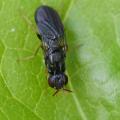



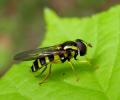
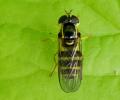

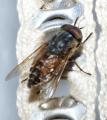
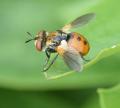



 but don't see the image in the post.
but don't see the image in the post.